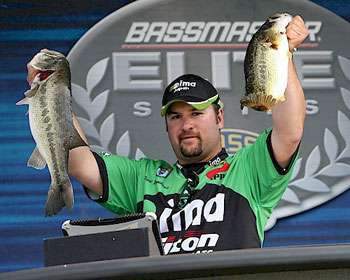
Curious onlookers who pass the Oklahoma home of Elite Series pro Fred Roumbanis and see a boat outside might assume that he's doing something other than fishing. For many top pros, who wouldn't be seen in anything less than a 20-foot boat with a 225-horsepower outboard, that assumption would be true, but in the case of Roumbanis it might prove false.
On his "off days," you can often find the California native probing local small waters, usually on foot. Sure, it's fun, but it's also a way for him to hone his tournament tactics in non-pressured situations.
"I grew up fishing golf course ponds, farm ponds and little reservoirs," he says. "The nice thing about them is that generally there are a lot of fish to be caught. Whenever you're around a lot of fish, it gives you the opportunity to try new baits and get instant confidence in them."
The approach makes sense for any touring pro — and weekend anglers as well. When tournament practice rolls around, there's limited time to locate the fish, let alone learn or refine a new technique. In the case of Elite Anglers, there are just two and a half days to cover massive impoundments. Local tournament anglers may know the body of water better, but often they have either one day or none before a tournament to practice.
"To be able to go out and fish smaller ponds, whether it's from a boat or from shore, I can spend hours on something and really dial it in — maybe a new knot I want to use to connect fluorocarbon and braided line, or a new frog bait, or a new technique altogether," Roumbanis continues. "Obviously the more fish you catch, the more confidence you gain. It's really a simple equation."
You might think that small waters equate to small baits, but once again you'd be wrong. The small-water practice that has benefited Roumbanis the most is in the swimbait genre.
"Swimbaits are the No. 1 example," he explains. "I learned to throw them on smaller reservoirs in California stocked with trout. I would go out and fish for bass that I knew were conditioned to eating a certain type of food: trout. I learned to mimic the way trout swim with my swimbaits. Then, when it's tournament time on a lake where bass are feeding on trout, I already know how they swim and how the fish react."
While there aren't many trout-stocked lakes on the major tournament trail schedules, the same reasoning applies to other baitfish as well. "In a shad situation, it's the same thing," Roumbanis says. "You can watch shad schools and study how fish react to the shad. You experiment with swimbaits that move a little quicker and swim a little tighter, with more vibration. You instantly gain confidence, knowing what to look for in a tacklebox."
Roumbanis says that fishing smaller waters is a mind opening experience as well: "You're learning a whole different approach to fishing," he says. "From shore, you're casting to deep water. It helps you learn how to position your boat, gives you a different angle to look for. There are many times fish position themselves in deeper water and look up to the bank to feed. If you don't look there, you're missing a lot of fish.
So, despite the big boat in the driveway, odds are that Fred is catching bass after bass from the nearest pond, tank or mud puddle. "I spend more time on small ponds than on big lakes," he says. "I never put my foot on a bass boat until I was 18 years old, but I've fished hard for bass since I was 8 years old."
The experience isn't all about learning — it's fun and addictive, too. As Roumbanis says, "It's something that's inside of me that I'll always want to do. If I see a little pond on the side of the road, I'll just about always stop and fish it."
(Provided by Z3 Media)





